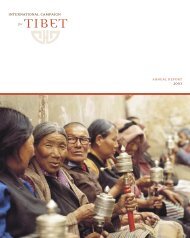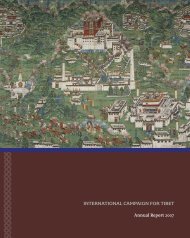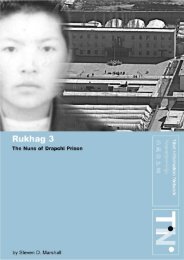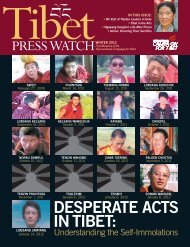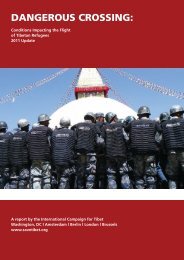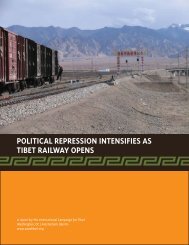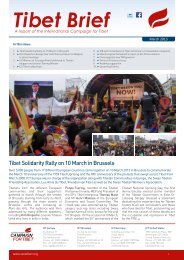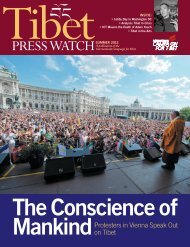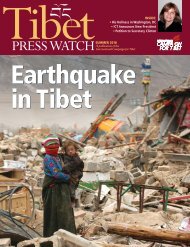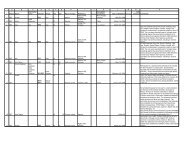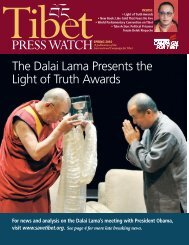download the report - International Campaign for Tibet
download the report - International Campaign for Tibet
download the report - International Campaign for Tibet
You also want an ePaper? Increase the reach of your titles
YUMPU automatically turns print PDFs into web optimized ePapers that Google loves.
TIBET AT A TURNING POINT: THE SPRING UPRISING AND CHINA’S NEW CRACKDOWN<br />
majority of <strong>Tibet</strong>ans, as are his claims that “The Central<br />
Party Committee is <strong>the</strong> real Buddha <strong>for</strong> <strong>Tibet</strong>ans.”<br />
TAR Party Secretary,<br />
Zhang Qingli<br />
Zhang’s political career started when he joined <strong>the</strong> Party in<br />
<strong>the</strong> early 1970s in his native Shandong province. During <strong>the</strong><br />
latter stages of <strong>the</strong> Cultural Revolution, a period when a<br />
degree of aggressive political fanaticism was essential to protect<br />
and advance one’s career in <strong>the</strong> Party, he quickly rose<br />
from being a general worker at a large fertilizer plant to become<br />
Deputy Party Secretary of <strong>the</strong> plant’s Party Committee.<br />
In 1979 he was seconded to <strong>the</strong> Central Committee of <strong>the</strong><br />
Communist Youth League of China (CYLC) in Beijing. He remained at <strong>the</strong> CYLC in various<br />
capacities until 1986, during which time he became an associate of Hu Jintao,<br />
who headed <strong>the</strong> CYLC from 1984–1985.<br />
Following postings to a sequence of increasingly senior Party positions mainly in<br />
propaganda departments, Zhang was transferred to <strong>the</strong> Xinjiang Uyghur Autonomous<br />
Region (XUAR) in October 1999 where he served on <strong>the</strong> regional Standing Committee<br />
— a core group within <strong>the</strong> regional Party Committee — as well as serving concurrently<br />
as Deputy Secretary and Commander of a large quasi-military industrial<br />
and agricultural concern in Xinjiang, <strong>the</strong> Xinjiang Production and Construction Corps<br />
(XPCC), commonly known by its abbreviated name in Chinese, <strong>the</strong> bingtuan. The<br />
bingtuan has de facto jurisdiction over several large towns in <strong>the</strong> XUAR, as well as over<br />
vast swaths of farmland, operating its own courts, prisons and o<strong>the</strong>r services such as<br />
schools and medical provision. Founded in 1954, <strong>the</strong> bingtuan has enabled <strong>the</strong> settlement<br />
of millions of Chinese farmers and workers in <strong>the</strong> XUAR, and has done so with<br />
a strong political message of promoting stability in <strong>the</strong> XUAR, as well as settling and<br />
consolidating <strong>the</strong> XUAR’s international borders.<br />
It was while he was in <strong>the</strong> XUAR that Zhang Qingli worked under <strong>the</strong> long-serving<br />
Party Secretary of <strong>the</strong> XUAR, Wang Lequan (see below), and where Zhang developed<br />
a reputation <strong>for</strong> his ideological fervor.<br />
As with <strong>Tibet</strong>, <strong>the</strong>re is a long history of opposition and resistance to China’s rule in<br />
Xinjiang, fuelled in large part by a conviction among many of <strong>the</strong> 8 million or so<br />
Uyghur people that Xinjiang — which Uyghurs frequently refer to by its historical<br />
name of East Turkistan — was an independent nation <strong>for</strong> much of its history, aside<br />
from occasional periods when imperial powers, including China, Russia and Britain,<br />
held military or political sway over <strong>the</strong> local political elites.<br />
100



